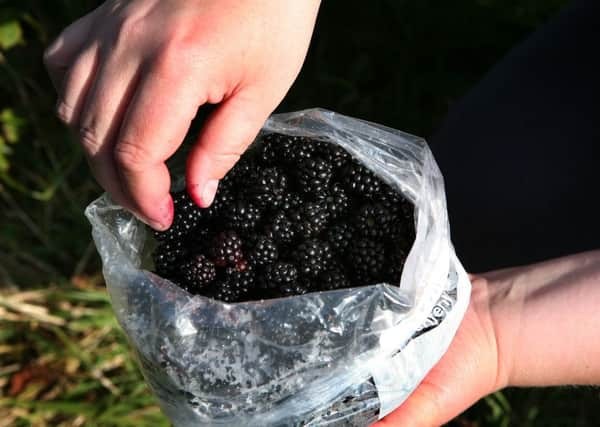Country & Coast: Daring decision to make on whether to pick blackberries


Michaelmas Day saw the devil being kicked out of heaven, it is said, and on falling to earth he apparently landed in a clump of thick and spiny blackberry bushes, furiously cursing the thorns which tore his flesh and rendering the berries inedible.
This year’s cool spring and summer has delayed the ripening of blackberries by about three weeks, and so there is a bumper late harvest in the hedgerows. Unless you are superstitious it would be such a shame to let them go to waste.
Advertisement
Hide AdAdvertisement
Hide AdThe tradition of not eating brambles after Michaelmas probably stems from the fact that the last berries to ripen can often taste sour and be more susceptible to mildew and bacteria as a result of wetter and cooler autumnal weather, observations which - as so often happened in medieval times - formed the basis of superstition.
We are at least a week or two away from that point judging by the brambles I plucked while walking along a track above Addingham in Wharfedale on Monday.
They were still plump, sweet and juicy and I was delighted to share them with a male pheasant, which perched on a nearby wall and craned its neck to eat the berries while performing a remarkable balancing act.
Blagging - the Yorkshire word for blackberry picking - is a great family tradition, and one that provides our breakfast toast with enough jam or jelly well into the New Year as well as a few freezer bags for pies and crumbles.
Advertisement
Hide AdAdvertisement
Hide AdWe are carrying on a tradition which goes back at least 2,500 years, since the seeds were found in the remains of an Iron Age woman in Denmark.
Blackberry juice is high in vitamin C, the seeds rich in omega-3 oils. In fine dining it is popular to serve roast grouse with a dribble or smear of blackberry coulis, the intense flavour complimenting the grouse breast’s strong taste.
Gathering blackberries is probably the only foraging that most people do these days, but very few who go out with collecting containers will know that there are more than 400 sub-species of the shrub Rubus fruticosus or that each one has a subtle difference in size and taste.
Blackberries were once planted on graves - you’ve guessed it - to keep out the devil.
Advertisement
Hide AdAdvertisement
Hide AdIn many forests blackberry bushes are regarded as pests because of the light that they deny the woodland flowers, but some foresters do leave them alone because they are also known to offer protection to young coppice shoots from destruction by deer.
The longest stems of blackberry bushes can reach up to 15ft and in Victorian times they were called “lawyers”, it is said, because once they have got hold of you it is very hard to get free.